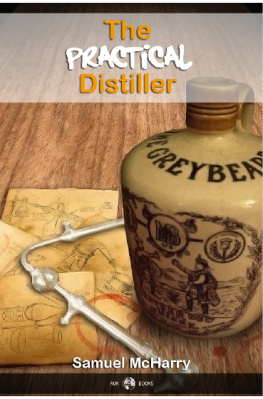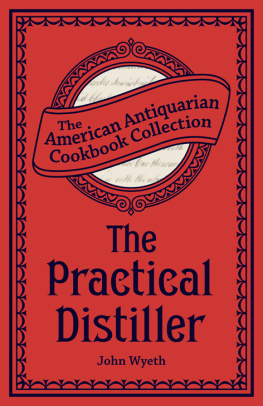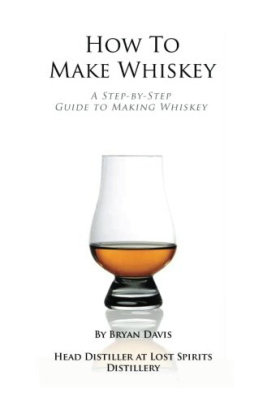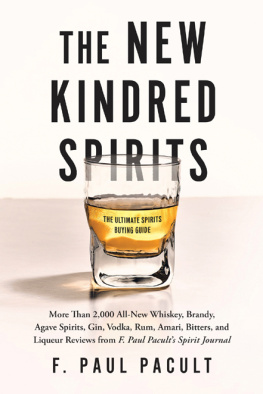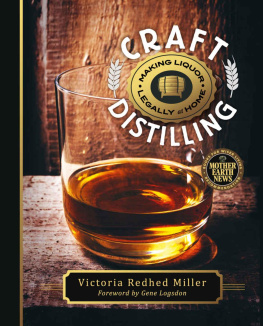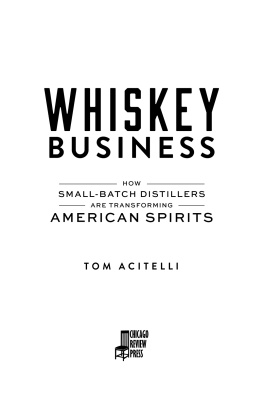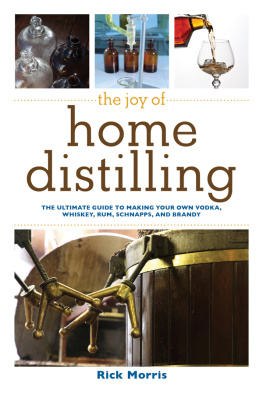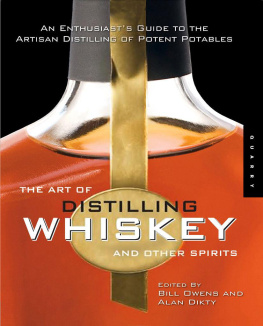Title Page
The Practical Distiller
SAMUEL McHARRY
Publisher Information
Published by Andrews UK Limited 2010
www.andrewsuk.com
This digital edition, including artwork, typography and formatting is copyright Andrews UK Limited 2010.
All rights reserved. No part of this book may be copied, or transmitted in any form or by any means, electronic, electrostatic, magnetic tape, mechanical, photocopying, recording or otherwise, without the written permission of Andrews UK Limited.
Copy source material originally published in 1808 in the United States of America
PREFACE
WhenI first entered on the business of Distilling, I was totally unacquainted with it. I was even so ignorant of the process, as not to know that fermentation was necessary, in producing spirits from grain. I had no idea that fire being put under a still, which, when hot enough, would raise a vapour; or that vapour when raised, could be condensed by a worm or tube passing through water into a liquid state. In short, my impressions were, that chop-rye mixed with water in a hogshead, and let stand for two or three days; and then put into a still, and fire being put under her, would produce the spirit by boiling up into the worm, and to pass through the water in order to cool it, and render it palatable for immediate useand was certain the whole art and mystery could be learned in two or three weeks, or months at farthest, as I had frequently met with persons who professed a knowledge of the business, which they had acquired in two or three months, and tho' those men were esteemed distillers, and in possession of all the necessary art, in this very abstruse science; I soon found them to be ignorant blockheads, without natural genius, and often, without principle.
Thus benighted, and with only the above light and knowledge, I entered into the dark, mysterious and abstruse science of distilling, a business professed to be perfectly understood by many, but in fact not sufficiently understood by any. For it presents a field for the learned, and man of science, for contemplationthat by a judicious and systematic appropriation and exercise of certain elements, valuable and salutary spirits and beverages may be produced in great perfection, and at a small expense, and little inconvenience, on almost every farm in our country.
The professed chymist, and profound theorist may smile at my ideas, but should any one of them ever venture to soil a finger in the practical part of distilling, I venture to say, he would find more difficulty in producing good yeast, than in the process of creating oxygen or hydrogen gas. Scientific men generally look down on us, and that is principally owing to the circumstance of so many knaves, blockheads and conceited characters being engaged in the business.If then, the subject could be improved, I fancy our country would yield all the necessary liquors, and in a state of perfection, to gratify the opulent, and please the epicure.
I had no difficulty in finding out a reputed great distiller, whose directions I followed in procuring every necessary ingredient and material for distilling, &c. He was industrious and attentive, and produced tolerable yield, but I soon found the quantity of the runs to vary, and the yield scarcely two days alike. I enquired into the cause, of him, but his answers were, he could not tell; I also enquired of other distillers, and could procure no more satisfactory answersome attributed it to the water, others to witchcraft, &c. &c.
I found them all ignorantI was equally so, and wandered in the dark; but having commenced the business, I determined to have light on the subject; I thought there must be books containing instructions, but to my surprise, after a diligent search of all the book-stores and catalogues in Pennsylvania, I found there was no American work extant, treating on this scienceand those of foreign production, so at variance with our habits, customs, and mode of economy, that I was compelled to abandon all hope of scientific or systematic aid, and move on under the instructions of those distillers of our neighborhood, who were little better informed than myself, but who cheerfully informed me of their experiments, and the results, and freely communicated their opinions and obligingly gave me their receipts. In the course of my progress, I purchased many receipts, and hesitated not to procure information of all who appeared to possess it, and sometimes at a heavy expense, and duly noted down all such discoveries and communicationsmade my experiments from time to time, and in various seasons, carefully noting down the results. Having made the business my constant and only study, carefully attending to the important branch of making yeast, and studying the cause and progress of fermentation, proceeding with numerous experiments, and always studying to discover the cause of every failure, or change, or difference in the yield. I could, after four years attention, tell the cause of such change, whether in the water, yeast, fermentation, quality of the grain, chopping the grain, or in mashing, and carefully corrected it immediately. By a thus close and indefatigable attention, I brought it to a system, in my mind, and to a degree of perfection, that I am convinced nothing but a long series of practice could have effected.
From my record of most improved experiments, I cheerfully gave receipts to those who applied, and after their adoption obtaining some celebrity, I found applications so numerous, as to be troublesome, and to be impossible for me to furnish the demands gratis, of consequence, I was compelled to furnish to some, and refuse others; a conduct so pregnant with partiality, and a degree of illiberality naturally gave rise to murmurs.
My friends strongly recommended a publication of them, the plan requiring the exercise of talents, order and method, with which I presumed myself not sufficiently versed, I for sometime obstinately refused, but at length and after reiterated solicitation, I consented to enter on the talk, under a flattering hope of affording useful information to those of my country engaged in the distillation of spirits from the growth of our native soil, which together with the following reasons, I offer as the only apology.
1st. I observed many distillers making fortunes, whilst others exercising an equal share of industry, and of equal merit were sinking money, owing to a want of knowledge in the business.
2d. In taverns I often observed foreign liquors drank in preference to those of domestic manufacture, though really of bad quality, possessing pernicious properties acquired from ingredients used by those in our commercial towns, who brew and compose brandies, spirits, and wines, often from materials most injurious to health, and this owing to so much bad liquor being made in our country, from which the reputation of domestic spirit has sunk. Whilst, in fact, we can make domestic spirits of various materials, which with a little management and age, will be superior to any of foreign produce.
3d. By making gin, &c. as good if not better, we might in a few years, meet those foreign merchants in their own markets, and undersell them; which we certainly could do, by making our liquors good, and giving them the same age. The transportation would of consequence improve them in an equal degree, for the only advantage their liquors of the same age have over our good liquors, is the mildness acquired by the friction in the warm hold of the ship in crossing the ocean.
And moreover as liquors will be drank by people of all standings in society, I flattered myself I could improve our liquors, render them more wholesome to those whose unhappy habits compel a too free use of ardent spirits, and whose constitutions may have been doubly injured from the pernicious qualities of such as they were compelled to use. For there are in all societies and of both sexes, who will drink and use those beverages to excess, even when there exists a moral certainty, that they will sustain injury from such indulgence, and as an evidence of my hypothesis, I offer the free use of coffee, tea, &c. so universally introduced at the tables of people of every grade.
Next page
